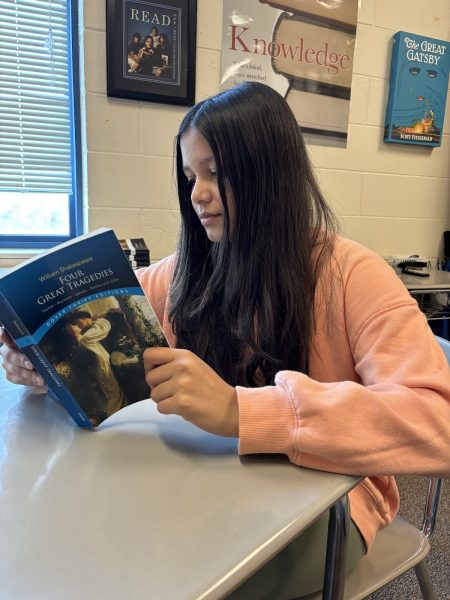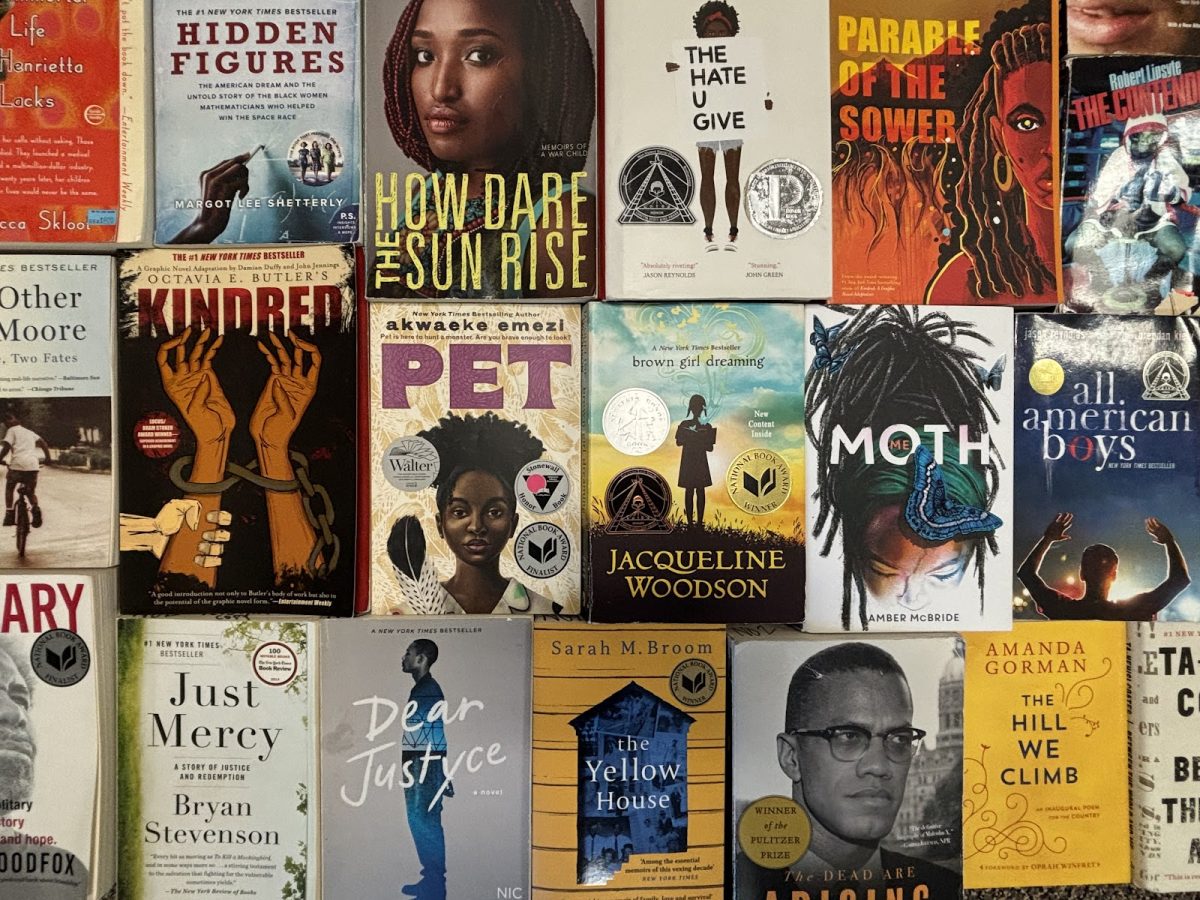Many might rejoice at the news that Grade Point Averages (GPAs) for teenagers across the nation are on the rise. However, this is not an accurate depiction of success in the classroom, as standardized testing scores and teenage reading abilities have declined in recent years. Therefore, this prominent grade inflation results in an overestimation of college readiness. College professors nationwide have shared their thoughts on the decline in literacy skills among their new students.
Having been in touch with several collegiate-level teachers, Green Hope Advanced Placement (AP) Literature and Composition teacher Ms. Jennifer Barnett has expressed concern over this issue to her students. She wants students to understand how vital foundational reading and writing skills are to future educational success.
“I’ve had conversations with professors from some different universities, and they have expressed, particularly in certain fields, that students are having a hard time keeping up with the amount of reading,” Ms. Barnett stated. “It’s not that they can’t read or that they don’t know how to make meaning out of the words that they’re being introduced to. It’s the volume of reading that they’re having trouble keeping up with.”
Taking to online platforms, it is evident that many professors are displeased with this trend among their new students. A Literature Humanities teacher from Columbia University discussed shock over how his students are unprepared to finish multiple books a semester. Twenty years ago, his classes could tackle the literary works of Pride and Prejudice and Crime and Punishment with ease. Now, he observes students struggling over a sonnet. They report to him their lack of lengthy literature assignments during their secondary education.
Accordingly, many analysts who are examining this issue blame middle schools and high schools for not assigning enough reading. Assigning full-length texts and extensive writing assignments is highly beneficial, as repetition and constructive feedback help students retain and heighten their reading and comprehension skills. While there certainly are cases where students are assigned brief reading excerpts and shorter writing activities, there is not sufficient enough research to place the blame entirely on this.
Others are finding a more pervasive issue to be the root of this problem. With the massive fluctuation of AI generative technology, there are many ways that students can avoid doing assigned reading and still receive a favorable grade. While platforms like CliffsNotes have existed for many generations, students now have access to technologies never seen before. SparkNotes can now be discreetly pulled up on iPhones, YouTube videos thoroughly summarize book plots and ChatGPT has the ability to write entire essays while masterfully embedding quotes. This explanation stumps many on how to combat it, as students are rapidly losing the skill to analyze detail and contextualize overall plots.
Kids are not only finding ways to avoid assigned reading, but some could argue that reading for fun is becoming unheard of. With the rise of iPhone dependency, attention spans are shortening and being bored is no longer an option. For many, the appeal of reaching for a phone and endlessly scrolling outweighs that of picking up a book and working through complex syntax and themes. This constant temptation inhibits preparation for the rigorous college curriculum.
In 2023, the NAEP collected data that backs up the hypothesis that teenagers are reading less than their parents did. The number of 13-year-olds who reported reading for fun “almost every day” was 14% in 2023, 27% in 2012 and 35% in 1984. While it is important to read daily to build these skills, the number of teenagers reading for fun “once or twice a week” has also declined since 1984.
“When students are enrolled in certain programs, such as pre-med or pre-law, they have so much trouble keeping up with the reading (and sometimes the writing as well) that they’re not able to solidify their affiliation in that program when the time comes. They have to then choose to do something else because they can’t continue in the program that they’re in. All this stems from this inability to keep up with the volume of reading that they’re doing,” Ms. Barnett elaborated.
Across the country, universities are realizing the gravity of this problem. In a last-ditch effort to catch new students up to speed, many colleges are creating remedial writing courses. According to a report from the Department of Education, 68% of students starting at public 2-year institutions and 40% of those starting at a 4-year public university took at least one of these classes between 2003 and 2009. Empire State University has implemented a zero-credit course called “Preparing for College Level Writing”. Similarly, the University of Florida provides an ENG1001 course that is described as having been “designed to help students develop basic college-level writing skills.”
Preparatory and remedial writing courses focus on extensive reading, rigorous writing workshops and group discussions. Frequent writing and peer collaboration can help students grow and maintain these vital skills. These are the types of activities that Ms. Barnett loves to bring to her classroom. When creating assignments for her college-level AP Literature class and Honors English courses, she considers the importance of repetition in skill retention.
“I know sometimes that might seem like, ‘Oh, they’re always making us read books and write and then talk about it,’ but that does prepare you for college. The critical thinking that’s involved with going through the process of analyzing what you’re reading and pulling information out of it gets you ready for intensive assignments in the future.” Ms. Barnett stressed that the most important way to prepare for standardized English tests is to read more. She helps her students by providing them with in-class reading time every day.
“Sometimes students will express that they don’t read much, so I do try to encourage students to read as much as possible,” she commented. “In English Three, we start the first 10 minutes of class every day with the students reading their novels. I really try to encourage them to use that time. You know, if you add it up, 10 minutes doesn’t seem like much, but at the end of the week, you’ve done almost an hour’s worth of reading”

In doing so, she provides her students with the opportunity to meet the national recommendation for reading. The teens use this time to finish assigned reading along with literature of their choice. She hopes that this will encourage them to read more in their spare time as well.
“The national recommendation is that you read 20 to 25 pages a night, and that’s just reading whatever is enjoyable to you, but also at a high enough level. As entertaining as Harry Potter is and stories like that, they’re not really helping you develop that muscle,” she said. “If you think of reading as requiring muscle strength the same way as you would lift weights. I mean, you don’t go from curling five pounds to curling 100 pounds just like that – you have to work up to it.”
When students read little in their free time, it is harder to make the jump to a situation where high amounts of reading are required. This can put many in a very strenuous situation. By prompting students to read more, she hopes students can build this muscle.
Moving beyond Ms. Barnett’s classroom, Green Hope as a whole provides many resources to teenagers to combat this issue. When asked how this school prepares students for college, Ms. Barnett laughs, replying, “Wow, do you have all day?”
Teachers and admin pride themselves on having created a school that effectively prepares students for college-level rigor. Though modern distractions are still prevalent, Green Hope actively strives to counter their effects.
“I think the teachers at Green Hope do a really good job,” she says earnestly. “I’ve been teaching long enough that I’ve heard back from students who have said that all the reading, writing and discussions prepared them immensely for what they faced in college.”
Many support systems are present to help students who are struggling in the face of rigorous classes and frequent distractions. Nidhi Vellanki, the vice president of tutoring for Green Hope’s National Honor Society, commented on the success and necessity of her program.
“NHS Tutoring is a student-led peer tutoring program. Last school year, around 95 students were tutored. This year, we have 33 students paired with a tutor so far, with more people signing up every day,” said Vellanki.
Though they receive most students who need help with math and history subjects. Vellanki asserts, “English and reading comprehension is the basis of all academic subjects. Even in math and science, literacy skills are integral because, without them, it is quite difficult to gain a well-rounded understanding of the subjects. These foundational skills make it easier and more manageable to learn new topics, which are extremely important, especially as students transition to college-level courses.”
Since many students now lack foundational literacy skills, they must rely on other methods to maintain their grades going through college. In turn, more people have started to notice the daunting issues created by this. Focus should be placed on helping students prepare for college-level rigor so they can keep up with textbook reading. This way, they don’t become cycled through the educational system and then meet college professors and employers vastly unprepared.












































































